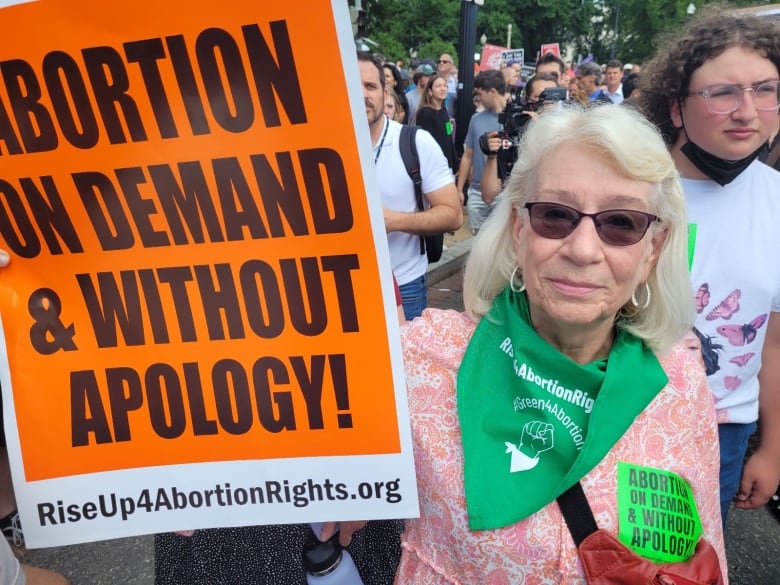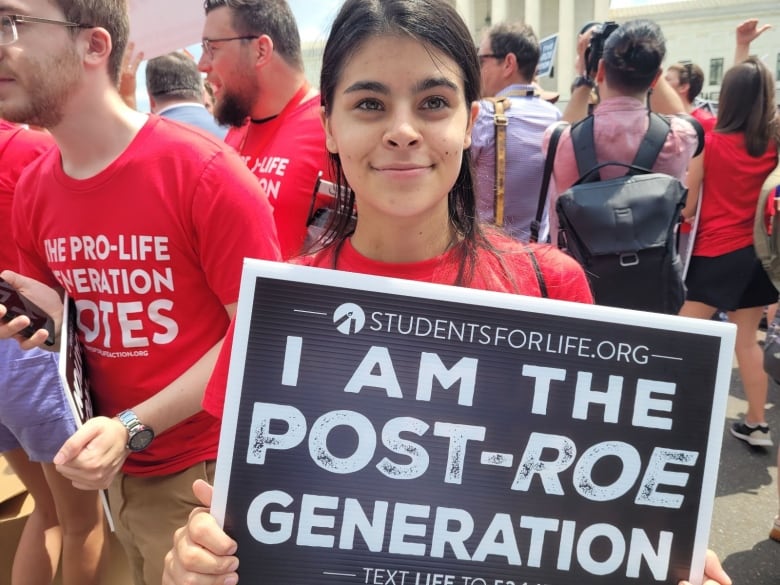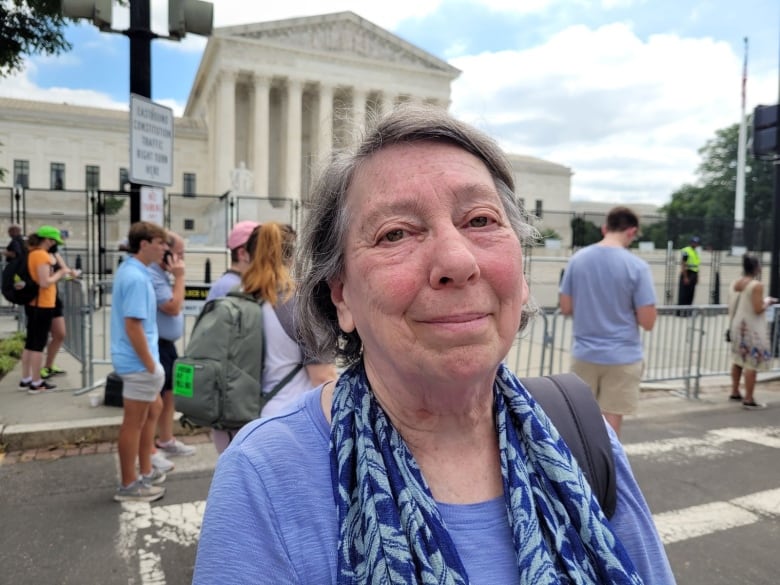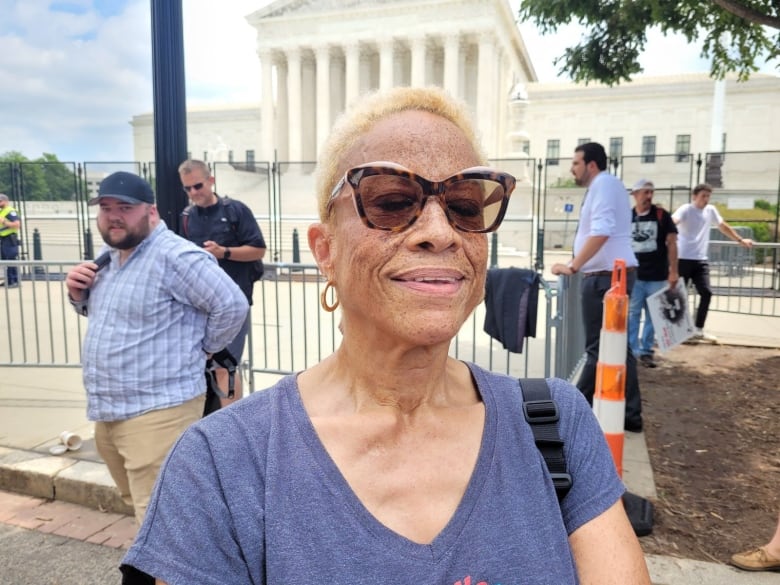Pregnant Janet Krazy, then 17 years old, had to travel from her Florida home to New York to have an abortion in 1971. It was the year. state.
Two years later, the US Supreme Court decided Roe v. We ruled on a case known as Wade and decided that the US Constitution protects women's right to terminate. Pregnancy and the state cannot interfere with its rights except in exceptional circumstances.
"Great" Clazy, 69 years old. "Someone asked me if I had been protesting the Roe v. Wade case all the time, and I said," No, I thought I had to. Our federal and Supreme Courts It's supposed to protect our rights. Over there. "
Retired musician Krazy went to Washington D on Friday. C. One of the hundreds of abortionists who gathered in front of the United States Supreme Court Building, in she expressed anger and disappointment. } The court's decision to dismiss her opinion 50 years ago.
A majority of conservative courts ruled 6-3 to overturn the Constitution's Roe v. Wade ruling, admitting that it does not protect the right to abortion, and states provide medical care. A procedure that paved the way for restrictions or total bans.

'I am overjoyed'
Over the past few weeks, a small group of abortionists and anti-abortion activists have gathered. In front of a 2.4-meter-high fence built around the Supreme Court , he was anxiously waiting for the ruling. After the leak of the court's draft opinion, the area was blocked as part of enhanced security measures.
On Friday, security was further strengthened and police stood behind the fence and arrested several people trying to climb it. Some security officials roamed the crowd, maintaining peace between opposing groups.
After 10 am, says on Dobbs v. Jackson Women's Health, banning abortion after testing Mississippi's law. Both groups, which were to be released for 15 weeks, became quiet.
Then a woman there to protest the abortion grabbed her megaphone and announced that "the Constitution does not give a fight against abortion." The
announcement was delighted by from those who opposed the right to abortion. They blew away the music and turned the area where gathered into a mini-street celebration.

For those who wanted the Roe v. Wade case not to be overturned, the decision was a blow and caused tears and distrust. And the chanting of "illegitimate".
However, a resident of North Carolina Ilona Schwartz was ecstatic to hear the decision.
"I am overjoyed," she said. "This is the best day of my life."

Schwartz was already in Washington D when his opinion went down. C. I was there. There was a meeting for students in the anti-abortion group, and was in her. The hotel when she learned of the decision.
"We all started screaming and jumping." We have to go to the Supreme Court right now, "she said.
She said she would continue to advocate to make abortion illegal in her own state.
Lauren Marlow, 22, from Fredericksburg, Virginia, also said she was excited to live in "Post-Low America."
Prochoice activists say they don't go silent
many later in the day Speakers after a person vowed that anti-abortion demonstrators left the area, the remaining pro-choice crowd became more rebellious, and the speakers continued the fight to promote the right to abortion. "Stand up for the right to abortion."
Carrie McDonald, who was in court waiting for the decision, said she would not accept the decision. He promised to continue fighting for the right to abortion in states that are planning to make it illegal or strictly regulated.
"We're going to fight back," she said. "We will never go. I will not accept the ruling."
Immediately after the decision was announced, the size of both groups increased and people It flooded the Supreme Court and formed a crush of swarms to join each side.

"I believe our rights have been deprived" A 66-year-old retired teacher from Ellensburg. Hannah Fredine said. Wash. "I went to high school in 1973 and believed that my daughter's safety and my granddaughter's safety would last a lifetime. 30-year-old Washington, DC resident Trisha Maharaj, who works for an economic think tank, has a boyfriend. When I sent her the news by text message, she said she was answering the work phone.
She was hoping for a decision after the disagreement, but she still "I was shocked at how overwhelming it is today," he said.

"I started crying right away. It didn't look very good, but I didn't care," she said. rice field.
"If I couldn't decide what would happen to my body, I wouldn't say anything about taxes, so I didn't know how to continue working today."

Fearing that other rights could be vulnerable
Debra Long-Doyle said when he heard the news He said he was at home, but went down to court "to show my support for the abolition of the Roe v. Wade case" that had to come.
Long Doyle fears that this decision is only the beginning of an erosion of rights and that future judgments may seek to revoke affirmative action, access to contraception, etc. She said.

Emotional Elizabeth White's civil rights lawyer, who repeatedly shouted, "There is no justice or peace," said the court battle had just begun.
"This is the worst news that can come out," she said. "It affects disproportionately to brown and black people. We know it. It affects disproportionately to transgender people — we know — poor women.
"But we will continue to fight for centuries."

For those who oppose abortion, this decision was also a signal to keep fighting, but for them, fighting upheld the right to abortion. It was to make abortion illegal in the state , which stated that it would continue to protect access to medical care.
Elizabeth Harris of North Carolina, who works for the anti-abortion group Sidewalk Advocate for Life, said she was overwhelmed by her gratitude for her decision.
She said down when the opinion came out, she was with some college students who became very emotional, but Harris said she needed some time. f

"But being [here] was very powerful and I was celebrating.
She said her organization is providing peaceful support to women seeking to provide abortion facilities.
As North Carolina is unlikely to soon limit or outlaw abortion, Harris said her work will continue, "because women always face unexpected pregnancies."



